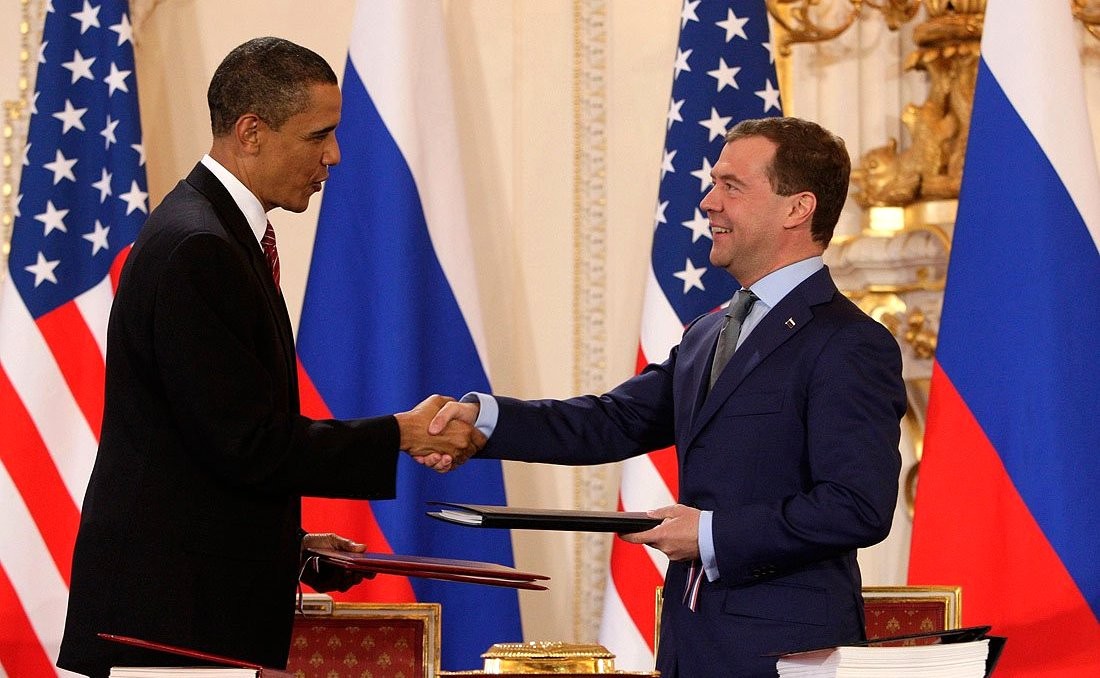The Russian Foreign Ministry has announced publicly that it will withdrawal from the inspection reciprocity of the New START (Strategic Arms Reduction Treaty) which allows both countries to review the stockpiles of strategic nuclear weapons. This announcement coincides with deteriorating relations between the two nations over the war in Ukraine. The Russian Federation has declared the United States party to the conflict in Ukraine due to its contribution of HIMARS and other advanced weapons systems to Ukraine.
New START replaced the Treaty of Moscow (SORT), which was to expire in December 2012. It follows the START I treaty, which expired in December 2009; the proposed START II treaty, which never entered into force; and the START III treaty, for which negotiations were never concluded.
The treaty calls for halving the number of strategic nuclear missile launchers. A new inspection and verification regime will be established, replacing the SORT mechanism. It does not limit the number of operationally inactive nuclear warheads that can be stockpiled, a number in the high thousands
From the Russian Foreign Ministry:
“On August 8, 2022, the Russian Federation officially informed the United States of America through diplomatic channels that our country was temporarily withdrawing its facilities subject to inspections under this Treaty from inspection activities under the START Treaty. This exemption also applies to venues that may host screenings as provided for in the Agreement.
Such actions are provided for in paragraph 5 of Section I of Chapter Five of the Protocol to the START Treaty. They may be undertaken in exceptional cases and for purposes not inconsistent with the Treaty. The Russian Federation is now forced to resort to this measure as a result of Washington’s persistent desire to implicitly achieve a restart of inspection activities on conditions that do not take into account existing realities, create unilateral advantages for the United States and effectively deprive the Russian Federation of the right to carry out inspections on American soil.
Our goal is to eliminate such an unacceptable situation and ensure that all START mechanisms operate in strict accordance with the principles of parity and equality of the parties, as was implied when it was agreed upon and entered into force. Now these principles are not maintained. Thus, as a result of anti-Russian unilateral restrictive measures taken at the suggestion of Washington, normal air traffic between Russia and the United States was interrupted, and the airspace of states that are allies and partners of the United States is closed to Russian aircraft delivering Russian inspection teams to points of entry on American territory. At the same time, there are no similar obstacles to the arrival of American inspectors in Russia. The Russian Foreign Ministry raised this issue with the relevant countries, but did not receive an answer. Additional difficulties for Russian inspectors and crew members of Russian aircraft traveling to the United States arise due to the tightening – again as part of Washington-inspired unilateral restrictive anti-Russian measures – the visa regime in transit countries along their possible routes. American inspectors and flight crew members do not experience such difficulties. All these and other issues known to the United States, on which the parties are exchanging through the channels provided for this, require a solution, without which it would be premature to resume inspection activities under the START Treaty, on which the American side insists.
We look forward to continuing close cooperation with the American side. We spoke and continue to speak in favor of considering the problem of resuming the inspection measures provided for by the Treaty from the most realistic positions. First of all, this involves taking into account the epidemiological situation associated with COVID-19, which remains very difficult. To date, there is no clear trend towards a reduction in the scale of the coronavirus pandemic and a decrease in the corresponding risks. We note, in particular, the renewed increase in the incidence rate in the United States, where more than 120,000 new cases of COVID-19 are now detected daily with 300-400 deaths.
We believe that in the current circumstances, the parties should abandon deliberately counterproductive attempts to artificially speed up the resumption of START inspection activities and focus on a thorough study of all existing problems in this area, the successful settlement of which would make it possible to return to the full application of all verification mechanisms of the Treaty as soon as possible. .
We would like to emphasize that the measures we have taken are temporary. Russia is fully committed to complying with all the provisions of the START Treaty, which in our eyes is the most important instrument for maintaining international security and stability. We highly appreciate his unique role in providing the necessary transparency and predictability in relations between Russia and the United States in the critically important nuclear and missile area. After the existing problematic issues regarding the resumption of inspection activities under the Treaty are resolved, the exemptions we have announced from inspection activities will be immediately canceled, and it will be able to begin to be carried out again in full. We are convinced that this would meet the interests of both Moscow and Washington. We are ready to contribute to the achievement of this goal.


